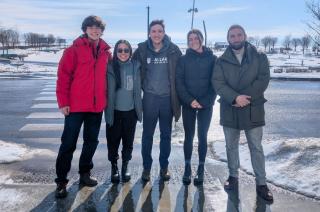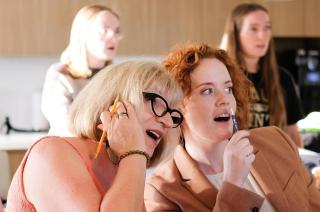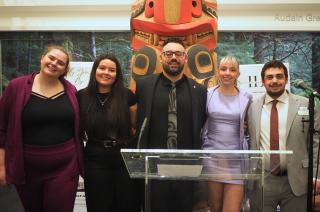Learning to think in public: A summer at the Law Commission of Canada

Adhithya Krishnan
Aug 29, 2025

Just inside the entrance to the Law Commission of Canada’s (LCC) office in Ottawa, there is a small, deliberate, and acutely intimate library. This library is a welcome, as its selection leans across doctrines and disciplines, inviting readers to think about “living law, pursuing justice, and renewing hope." If you step deeper into the space and glance toward the glass of the main conference room, you notice a subtle etching of the Commission’s theme of intersections. To me, it suggested that the real work happens where ideas meet, where legal traditions converse, and where public purpose crosses academic method.
From May to August 2025, I was a researcher with the LCC. After the onboarding that comes with any federal institution, what struck me was the combination of a flat organizational structure and open-door access to senior leadership. This completely stand-alone organization in the federal government is small enough that questions do not travel through layers, and serious enough that ideas are expected to carry their own weight. The LCC’s mandate is widely understood. In statute, the Commission keeps Canadian law under systematic review across both common law and civil law and gives independent advice on improvements, modernization, and reform so the system stays just and responsive to an ever-changing Canada. That tone shaped my summer and, more importantly, sharpened my sense of how law reform can serve the public.
Before I joined the LCC, much of what I admired about the Commission came from its public-facing architecture. It’s curated research streams are accessible to a general audience and rigorous enough academic contributors. The Beyond Tomorrow reports invite established scholars to ask what Canada should be thinking about for the future of legal reform. The Charity and Law project examines how the law enables and constrains charitable life across jurisdictions and traditions. The Prison Law work brings focus to questions that are often discussed without the voices of those most affected. Even the Commission’s new podcast, Obiter, reflects a commitment to conversation as a method of being. In all of this, the Commission makes an argument about how knowledge should move: outward, in dialogue, and toward people who may never pick up a law review.
Once inside, these concepts became habits. My projects ranged across the Commission’s portfolio. I edited draft papers for the LCC’s Charity and Law series and I drafted a paper in criminal law domain. I also supported engagement work, including research for potential Obiter guests and background notes for conversations about the Commission’s future directions.
The rhythm of the workplace was anchored by our weekly team meetings. In rotation, each of us came prepared to present a book that had stretched our thinking, surface a challenging legal question, or highlight a compelling news article that we had encountered that week. In one meeting, I traced how sociological research on gang violence in Chicago might help a Canadian law reform body weigh dignity, safety, and accountability in a way that is principled without being naïve. In another, I asked whether a national commission like the LCC in a plural federation could act like a forum that convenes differences or a cartographer that maps them with care.
In a relatively flat organization like the LCC, student contributions do not disappear into a buffer – they operate where decisions are made. Some days this was exhilarating, and other days it made me quiet at my desk, conscious of every subject and predicate in every sentence I wrote. Beginning this role, I had just completed my first year of law school and the stakes were as real as they could get for someone so early in their legal career. Whether it was the quiet thrill of editing a sentence and watching an author’s argument snap into focus or the patient collegiality of line-editing charity law submissions that had good bones and needed better framing, there were several small moments that shaped me.
However, imposter syndrome never vanished; it merely changed shape. Early on, it felt like a fear of being found out. Later, it became a commitment to being worthy of the trust the Commission placed in its students. The difference is subtle but important, the first shrinks your world but the second enlarges your standards. My solace came from the fact that I was not alone in learning how to do this work. My fellow students, Maxwell Brodie, Diana Ebadi, and Charlotte Ruffo, were each incredibly qualified in their own ways and made my time in the office incredibly pleasant. More than that, they helped make the office in Ottawa feel like a community rather than a posting. Near the end of the term, the office felt less like a temporary stop and more like a place where I was wanted to bring my best and perhaps linger for just a bit longer.
I want to draw attention to a conversation with President Van Praagh that stays with me. Many leaders describe their work from a high vantage point and then operate from a very different place. In our discussion, the vantage point and the day-to-day were aligned. She spoke about the Commission’s responsibilities in a way that held humility and ambition together. We talked about how law reform needs to include more diverse actors and perspectives as well as how the LCC can carve out a space that is roomy and independent from other law commissions. I left with the sense that the LCC’s structure is around a theory of change made practical.
My courses at Allard Law helped me to meet the moment. Indigenous Settler Legal Relations taught me to begin from relationships and responsibilities rather than from abstractions. Public Law gave me a map of constitutional structure that repaid attention in every memo. In sum, I am feeling deeply grateful. To the leadership and staff of the LCC, thank you for the trust and for the chance to contribute to an institution that takes “living law, pursuing justice, and renewing hope” seriously. To Maxwell, Diana, and Charlotte, thank you for the camaraderie and the kindness. To my professors at Allard, thank you for the habits of thought that travel beyond the lecture room. I am honoured to have learned in a place that believes that every Canadian is a jurist in their own regard and has the capacity to engage with the work of making the law work.
- Allard School of Law


